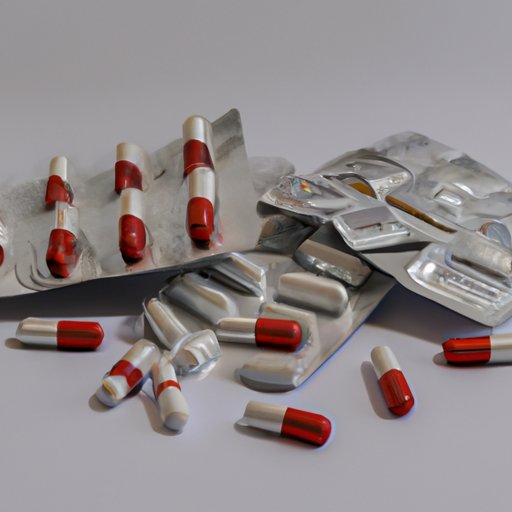
Introduction
Medicine plays an essential role in healthcare, but have you ever stopped to think about how it actually works? Understanding how medicine interacts with our bodies and treats illness is important not only for patients and caregivers but for anyone interested in healthcare. In this comprehensive guide, we will explore the science behind medicine, how it interacts with our bodies, its role in treating disease, and the latest advancements in the field.

The Science Behind Medicine: Understanding How It Works
Medicine can be broadly defined as any substance or treatment used to prevent, cure, or alleviate a disease or condition. The history of medicine dates back to ancient times when people used herbal remedies and other natural products to treat illness. With the advancement of science and technology, medicine has become more advanced and complex.
Today, medicine encompasses a wide range of treatments, including pharmaceutical drugs, surgical interventions, and complementary therapies. Drugs can be classified as either over-the-counter (OTC) or prescription medications. OTC drugs are available without a prescription and are typically used to treat minor ailments such as headaches, fever, or allergies. Prescription drugs, on the other hand, require a doctor’s authorization and are used to treat more serious or chronic conditions.
Pharmaceutical drugs are developed through a rigorous process of research and testing. Scientists first identify new drug compounds through various methods, such as screening natural products and synthesizing new chemical compounds. Once a promising drug candidate is identified, it undergoes several phases of testing in animals and humans before it can be approved for use.
In addition to pharmaceutical drugs, many people turn to alternative or complementary therapies such as herbal remedies, acupuncture, or massage therapy to treat their conditions. These therapies are often based on traditional knowledge and have been used for centuries to treat illness.
How Medicine Interacts with Our Bodies: A Comprehensive Explanation
Medicine can enter the body in a variety of ways, including oral ingestion, topical application, and injection. Once inside the body, drugs are absorbed into the bloodstream and transported to various organs and tissues.
The liver plays a key role in metabolizing drugs, breaking them down into smaller, less harmful substances that can be excreted from the body through the kidneys, digestive system, or sweat. Other organs, such as the kidneys and lungs, also play important roles in eliminating drugs from the body.
Different drugs interact with the body in different ways. Some drugs work by binding to specific receptors on cells, while others interfere with the biochemical processes of cells. Some drugs even change the structure or function of DNA in the body.
The immune system also plays a crucial role in mediating the effects of drugs on the body. The immune system recognizes foreign substances such as drugs and tries to remove them from the body. This is why some drugs require higher doses or more frequent administration to be effective – the body is actively working to remove them.
From Molecules to Healing: A Journey Through the Mechanics of Medicine
Developing a new drug is a complex and time-consuming process that can take years or even decades. It often begins with the identification of a new drug compound and its testing in animal models.
Once a drug shows promise in animal studies, it moves on to clinical trials in humans. These trials are conducted in several phases and involve increasingly larger groups of participants. The purpose of clinical trials is to evaluate the safety and effectiveness of the drug and to identify any potential side effects or risks.
After clinical trials are completed, the drug must be approved by regulatory agencies such as the Food and Drug Administration (FDA) in the United States. Once approved, the drug can be prescribed by doctors and used by patients to treat their conditions.
Specific examples of common drugs include antibiotics, painkillers, and antidepressants. Antibiotics work by killing or inhibiting the growth of bacteria, while painkillers reduce pain by blocking nerve signals. Antidepressants work by altering levels of neurotransmitters in the brain and improving mood.
Unpacking the Mystery: How Medicine Targets and Fights Disease
Medicine is used to treat a wide variety of diseases and conditions, from cancer and heart disease to mental illness and infectious diseases. The mechanisms by which medicines fight disease can vary depending on the type of illness being treated.
In cancer treatment, for example, drugs are used to kill cancer cells or prevent them from spreading. Chemotherapy drugs work by targeting rapidly dividing cells, which are common in cancer cells. Radiation therapy targets cancer cells by using high-energy rays to damage their DNA.
Antiviral drugs are used to treat viral infections such as HIV and hepatitis C. These drugs work by blocking the replication of the virus and preventing it from spreading in the body.
Demystifying Modern Medicine: An Overview of its Mechanisms and Functions
Modern medicine has made significant advances in the prevention and treatment of illness. Routine vaccinations have virtually eliminated many infectious diseases that were once widespread, while new drugs and treatments have been developed for a wide variety of conditions.
Medicine is often integrated with other forms of healthcare, such as surgery and physical therapy, to provide a comprehensive approach to treating illness. Pharmacists play an important role in healthcare by working with doctors and other providers to ensure patients receive safe and effective treatments.
Innovative Methods in Medicine: Keeping up with the Latest in Medical Advancements
Technology is rapidly changing the way medicine is practiced and delivered. Personalized medicine, for example, uses genetic information to tailor treatments to an individual’s unique genetic makeup. Gene therapy, the use of genetic material to treat or prevent disease, is a promising area of research.
Telemedicine allows healthcare providers to consult with patients remotely, increasing access to healthcare in remote or underserved areas. Artificial intelligence is being used to analyze medical data and help providers make more informed decisions.
Conclusion
Understanding how medicine works and how it interacts with our bodies is essential for anyone interested in healthcare. From the science behind drug development to the mechanisms by which drugs fight disease, medicine is a complex and dynamic field. Staying informed about the latest advancements in medicine and collaborating with healthcare providers is key to ensuring safe and effective treatments for all patients.





